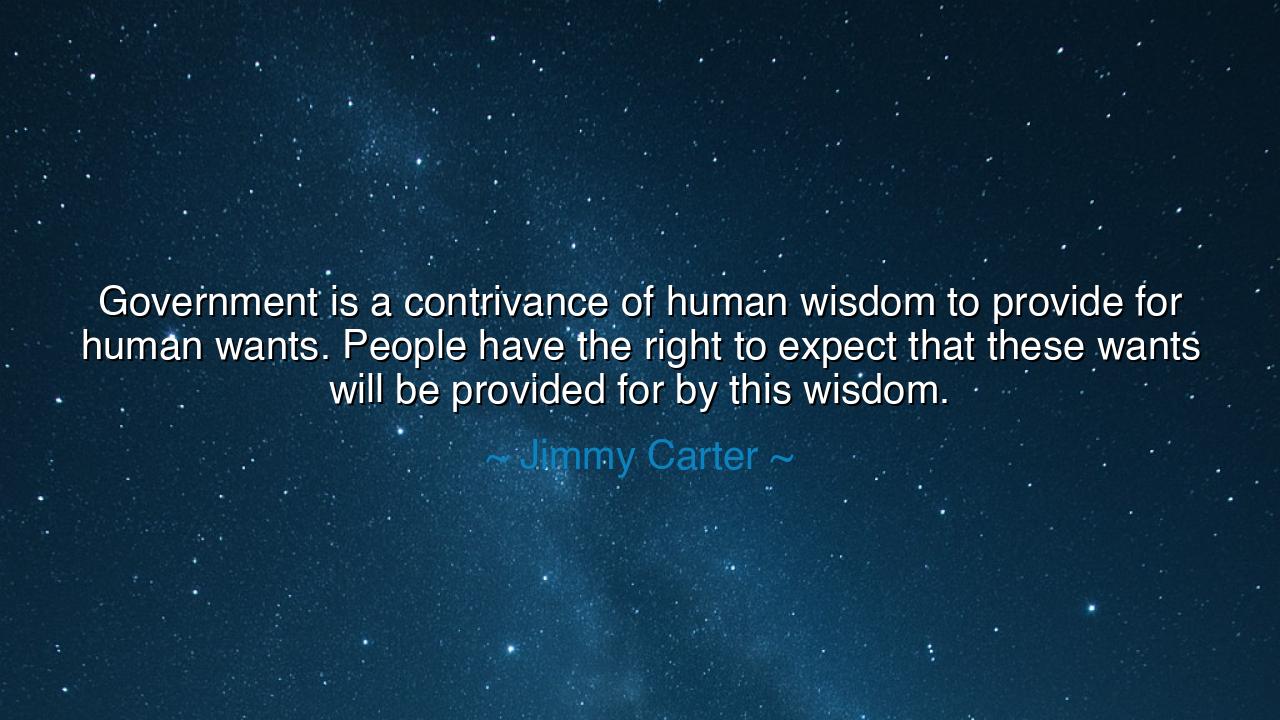
Government is a contrivance of human wisdom to provide for human
Government is a contrivance of human wisdom to provide for human wants. People have the right to expect that these wants will be provided for by this wisdom.






Hear me, O children of the future, for I bring you the wisdom of Jimmy Carter, who declared: "Government is a contrivance of human wisdom to provide for human wants. People have the right to expect that these wants will be provided for by this wisdom." These words speak to the very foundation of government—that it is not a tool of oppression or mere control, but a creation of human intellect and compassion, designed to meet the needs of the people. It is an institution grounded in the principle that those in power should act not out of self-interest, but in service to the common good, guided by wisdom and a deep understanding of the people's needs.
Consider the ancient Greeks, who birthed the idea of democracy, a system of government grounded in the belief that those in power must serve the people, and not the other way around. Pericles, a leader of Athens, spoke of the importance of providing for the needs of the citizens, ensuring that the wisdom of the leaders was used to promote justice, education, and the welfare of all. In his view, government was a sacred duty, an act of wisdom that should be focused on uplifting the community, securing their rights, and ensuring their well-being. Pericles understood that for a government to be just, it must consider the needs of all and seek to meet them with care and equity.
In more recent times, the life of Abraham Lincoln offers a powerful example of government in action as a force for justice and the common good. During the Civil War, Lincoln’s government sought not only to preserve the union but to end the horrific institution of slavery, which oppressed millions. Lincoln’s wisdom was not simply in the policies he enacted, but in his deep understanding that a government must be rooted in the protection of human dignity and freedom. His actions were an embodiment of the idea that government exists to provide for the needs of the people, even if it requires sacrifice and courage to challenge entrenched powers.
Think also of Franklin D. Roosevelt, whose leadership during the Great Depression was a testament to the power of government guided by wisdom to meet the needs of the people. Roosevelt understood that the government's role was not merely to wield power, but to provide for the welfare of the vulnerable, to create programs that would lift the nation from despair. His New Deal programs were grounded in the belief that government must be a force for the common good, responding to the cries of those suffering, and restoring hope in times of crisis. Roosevelt’s wisdom lay in recognizing that the true measure of a government’s worth is not in its grandeur, but in its ability to meet the human needs of its citizens.
So, O children, understand this: government is not a distant force to be feared or blindly obeyed, but a creation of human wisdom meant to serve the people. Those who wield power must be guided by a deep sense of duty to provide for the needs of their fellow humans, ensuring that no one is left behind, and that the welfare of the community is paramount. As Carter and those before him have shown, the true test of a government lies in its ability to meet the challenges of its time, to respond with compassion and wisdom to the needs of its people, and to ensure that all are treated with fairness and justice. Let this be your guiding principle: a government exists not for the benefit of a few, but to uplift and provide for all its people with wisdom and care.






VNvy nguyen
This quote strikes me as both hopeful and demanding. It implies that citizens have not just rights but expectations that their government act intelligently and compassionately. But what happens when public trust erodes because those expectations aren’t met? Should people reform the system from within, or seek alternatives when wisdom turns into bureaucracy? I think Carter’s view challenges us to rethink civic responsibility as much as political leadership.
MTLe Thi Minh Thu
Reading this, I can’t help but wonder whether expecting wisdom from government is realistic in today’s climate. With so much polarization and short-term thinking, has politics lost touch with its original purpose—to care for people’s welfare? Maybe the problem isn’t the idea of government itself, but the erosion of the wisdom and empathy that should guide it. Is democracy failing to produce leaders with that kind of moral insight?
NTThuy Anh Nguyen Thi
I find this statement idealistic yet grounded in truth. It suggests that people not only deserve competent leadership but also moral leadership. Do modern governments still see themselves as responsible for meeting people’s basic needs, or have they become too focused on maintaining systems and markets? It feels like Carter is reminding us that the legitimacy of any government depends on how well it serves ordinary human beings.
MBMaianh Bui
This quote makes me think about the fundamental purpose of government and how often it falls short of that goal. If governance is truly an act of wisdom, then why do so many policies seem to serve the powerful rather than address genuine human needs? Maybe the challenge lies in balancing compassion with practicality. I’d like to know how Carter would define 'human wisdom' in a political system often driven by self-interest and partisanship.